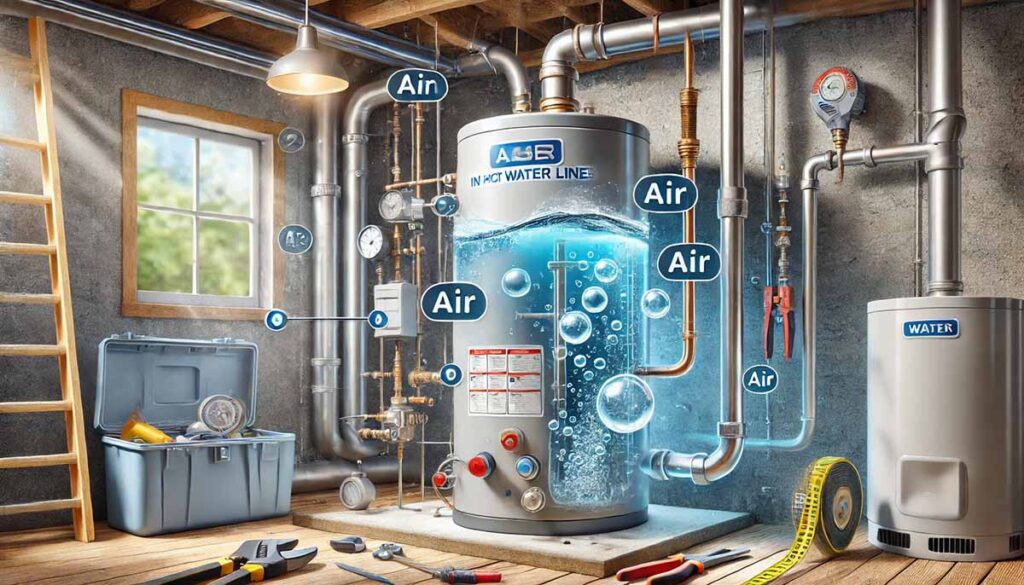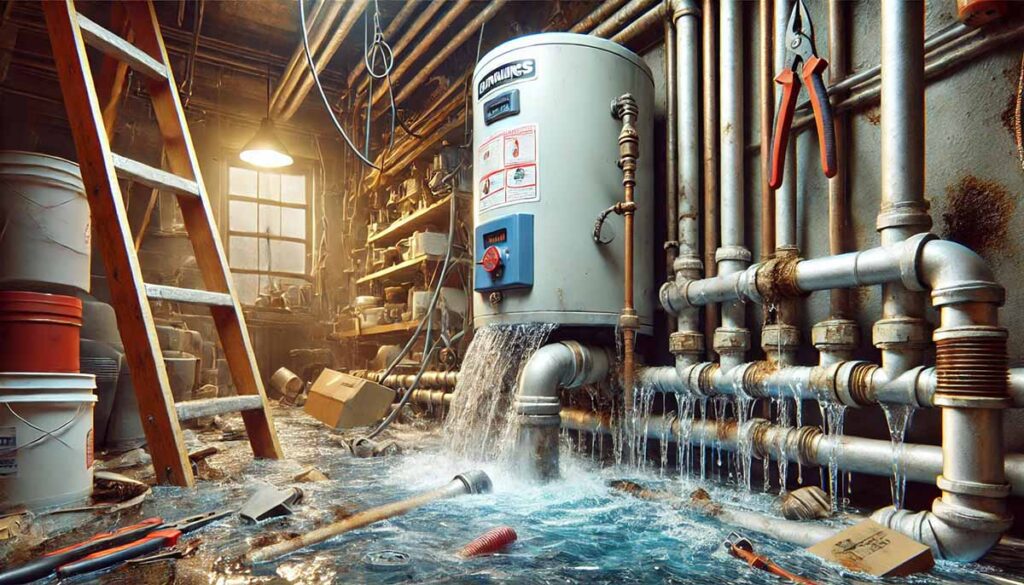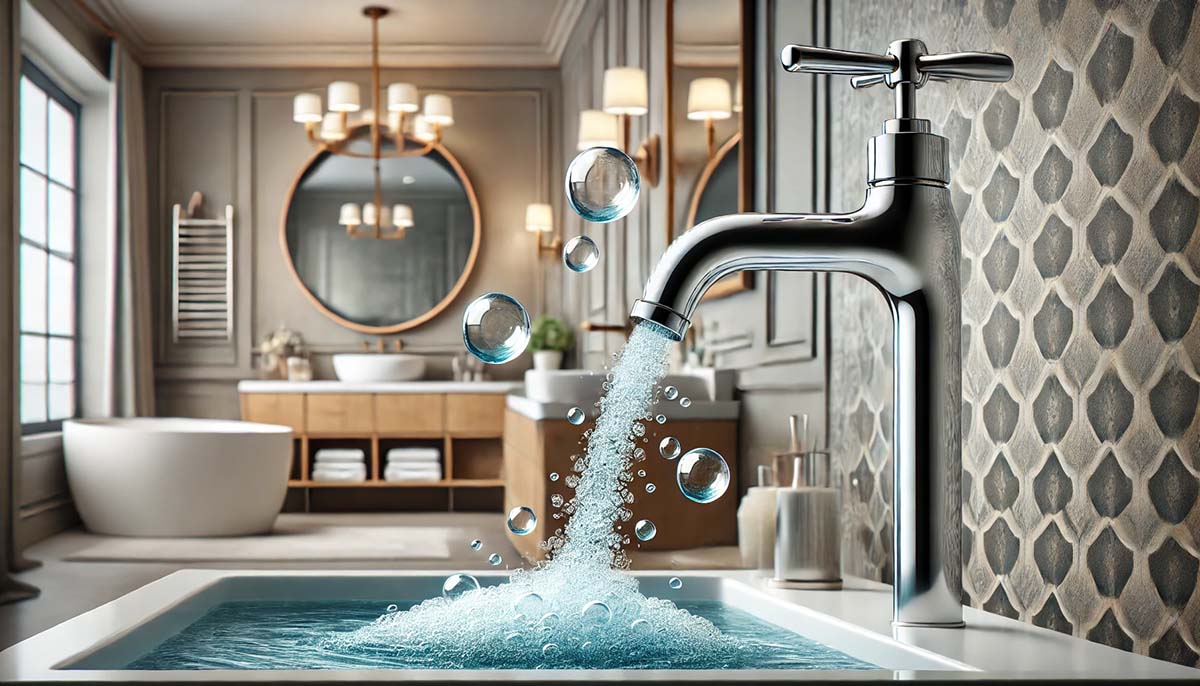Running hot water is a staple of modern living, from morning showers to cleaning up after dinner. But what happens when you turn on the faucet instead of a steady stream of water? Do you hear sputtering or notice inconsistent water pressure? You may be dealing with air in hot water lines.
This seemingly small problem can cause big problems if left unchecked. In this post, we will explore the causes of air pollution in hot water lines, how to fix it, and most importantly, how to avoid it in the first place.
Understanding Air in Hot Water Lines
Before we jump into solutions, let us first understand what it means to have air in hot water lines. Essentially, this refers to air bubbles trapped in your home’s hot water plumbing system.
Signs of Air in Hot Water Lines
Some common signs that indicate air is trapped in your hot water lines include:
- Sputtering Faucets: When you turn on the hot water and it spits or sprays unpredictably.
- Gurgling Sounds: Strange noises, like gurgling or banging, coming from the pipes.
- Cloudy Water: If the water is not clear and appears bubbly or frothy.
- Low Water Pressure: A noticeable drop in the usual water pressure.
These symptoms reduce your daily schedule and point to more serious plumbing system problems requiring quick fixing.
Causes of Air in Hot Water Lines

Understanding the causes of air in your hot water lines is crucial to finding the right solution. Several factors can introduce air into your system, and each requires a specific approach to fix.
Corrosion in the Water Heater
One of the most common causes of air in hot water lines is corrosion within the water heater. When the inside of your water heater begins to corrode, a chemical reaction can occur, producing hydrogen gas. This gas builds up and is eventually released through your hot water lines when you turn on the tap.
Solution: Regular maintenance and the use of a powered anode rod can help prevent corrosion. The purpose of these rods is to draw in corrosive substances, shielding the remaining parts of the water heater. If you suspect corrosion is causing air in your lines, it may be time to check your water heater or consult a professional.
Anode Rod Reaction
Water heaters typically come with a factory-installed magnesium anode rod. While this rod is essential for preventing corrosion, it can react with the water in your tank, producing hydrogen gas. This gas then gets trapped in your hot water lines, leading to air bubbles.
Solution: If you notice that air in the lines persists despite other measures, consider replacing the magnesium anode rod with an aluminum or powered anode rod, which produces fewer gases. However, removing the anode rod altogether is not recommended as it could shorten the lifespan of your water heater.
Water Supply Interruptions
Another common cause of air in hot water lines is when the water supply is interrupted, such as during municipal maintenance or when the water is turned off for plumbing repairs. When the water is turned back on, air can become trapped in the pipes.
Solution: After any water supply interruption, make sure to purge the system by running all faucets until the water flows smoothly without sputtering.
Renovations and Plumbing Work
Any major plumbing work or home renovations that involve the water system can introduce air into the lines. This is often unavoidable but should be addressed immediately to prevent ongoing issues.
Solution: After renovations, follow the steps to purge the system (discussed below) to ensure no air remains in the pipes.
Risks Associated with Air in Hot Water Lines

Ignoring air in hot water lines can lead to more than just annoying noises and sputtering faucets. Several risks associated with this issue can impact your home and even your health.
Potential Damage to Plumbing and Appliances
Trapped air can cause increased wear and tear on your plumbing system. The constant pressure fluctuations can weaken pipe joints, leading to leaks over time. However, appliances like washing machines and dishwashers that depend on a constant water flow may experience decreased lifespan and efficiency.
Increased Water Heater Wear and Tear
When air enters the water heater, it can lead to uneven heating and pressure build-up, which strains the system. Over time, this can result in premature failure of the water heater, necessitating costly repairs or replacements.
Health Implications
Air in water lines can sometimes carry contaminants that affect water quality. This can lead to health issues if the contaminated water is consumed. Water that appears hazy or discolored is an obvious indication of a problem that must be fixed immediately.
DIY Solutions to Fix Air in Hot Water Lines
Fortunately, fixing air in hot water lines can often be done without the need to call in a professional. Here is a step-by-step guide to help clear the air and restore normal water flow in your home.
Step 1: Cut Off the Primary Water Source
The first step in resolving the issue is to shut off the main water supply to your home. This valve is usually located in the basement or near the foundation. Turning off the water stops any more air from entering the system.
Step 2: Open All Faucets and Appliances
Once the water supply is off, open all the faucets in your home, both hot and cold, starting with the one closest to the main water valve. This helps to create a path for the air to escape.
Remember to include appliances connected to the water supply, such as washing machines and dishwashers. Let the water run until it stops completely.
Step 3: Flush All Toilets
Next, flush all the toilets in your home. This step helps remove any remaining water and air from the plumbing system.
Step 4: Restart the Water Supply
After the faucets and toilets have stopped running, it is time to turn the main water supply back on. Do this slowly to avoid creating a water hammer, which could damage your pipes.
Allow the water to run through all the faucets for about 10-15 minutes. Listen for any hissing sounds or pops and check for a steady stream of water without any sputtering. Once the water flows smoothly, start turning off the faucets, beginning with the last one you opened.
Following these steps should help clear the air from your hot water lines. Calling a professional might be necessary if the issue continues.
When to Call a Professional
While many cases of air in hot water lines can be resolved with DIY methods, there are times when professional help is necessary. Here are some situations where you should consider contacting a plumber:
- Persistent Air in Lines: If you have followed all the DIY steps and the problem persists, your plumbing system may have a deeper issue.
- Signs of Corrosion: If your water heater or pipes show obvious signs of corrosion, a professional should look at the issue and fix it.
- Water Heater Issues: If your water heater is malfunctioning, especially if it is producing air in the lines, professional assessment and repair may be required.
Preventative Measures to Avoid Air in Hot Water Lines
Regarding plumbing problems, in particular, prevention is always preferable to treatment. Taking a few preventative measures can significantly reduce the likelihood of encountering air in hot water lines.
Regular Maintenance of the Water Heater
Regularly inspect and maintain your water heater. This includes checking for signs of corrosion, replacing the anode rod when necessary, and ensuring that the pressure relief valve is functioning correctly. A well-maintained water heater is less likely to introduce air into the hot water lines.
Timely Anode Rod Replacement
Anode rod protection is essential for preventing corrosion in your water heater. It can become worn out over time and require replacement. Air in the hot water lines is less likely to occur when the anode rod is replaced before it fails and hydrogen gas accumulation is stopped.
Avoiding Air Entry During Renovations or Maintenance
When performing any plumbing work or renovations, ensure the water supply is turned off correctly, and the system is properly purged afterward. By doing this, air leaks in the lines will be less likely.
Installing Water Hammer Arrestors and Pressure Relief Valves
Air entrapment in your hot water pipes can be avoided by installing water hammer arrestors and properly ensuring your pressure relief valves function. These devices help manage pressure changes and reduce the risk of air entering the system.
Product Recommendations for Long-term Fixes
If you are looking for a long-term solution to prevent air from entering your hot water lines, consider investing in quality products that protect your plumbing system.
Powered Anode Rods
Powered anode rods, like those offered by Corro-Protec, are an excellent investment for your water heater. These rods prevent corrosion and stop the chemical reactions that produce hydrogen gas, reducing the likelihood of air in your hot water lines.
Benefits:
- Prevents Corrosion: Protects the water heater from internal corrosion.
- Stops Hydrogen Gas Production: Reduces the risk of air in the hot water lines.
- Long-lasting: Requires less frequent replacement compared to traditional anode rods.
Where to Buy: Most home improvement stores and online retailers carry powered anode rods.
Conclusion
Hot water lines with air in them may seem annoying, but they can develop larger issues if left unchecked. You can take the required actions to address and stop the problem from reoccurring by being aware of the causes, dangers, and remedies.
Maintaining the optimal performance of your plumbing system necessitates timely intervention and routine maintenance. Calling a professional to ensure your home’s plumbing is in good condition is a good idea if you ever find yourself over your head.
FAQs Section
Why is air constantly getting into my water pipes?
Various factors, including recent plumbing work, a malfunctioning water heater, or issues with the local water supply, can cause air in water pipes. Regular maintenance and ensuring your system is free from leaks can help reduce the occurrence.
Will air in pipes cause a tapping noise?
Yes, air trapped in your water pipes can cause a tapping or banging noise. This phenomenon, known as a water hammer, occurs when water flow is suddenly stopped, causing pressure waves that can damage your pipes if left unaddressed.
Can air in pipes be caused by a hot water heater?
Absolutely. A malfunctioning hot water heater can build up gases that are released into the hot water supply lines, leading to air in the pipes. Regular maintenance and checking of the anode rod can help prevent this issue.
If you found our content helpful don’t forget to share it on your social media: Twitter.
For more insightful articles, please visit Bloghart.

